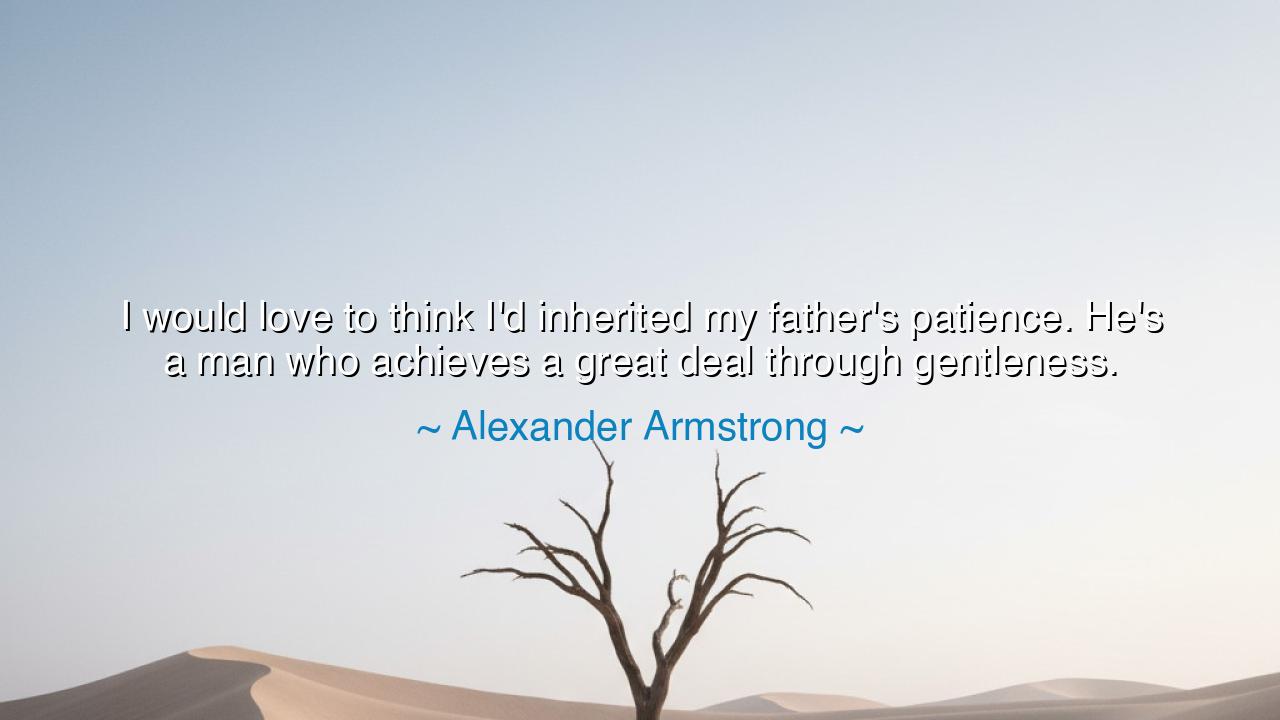
I would love to think I'd inherited my father's patience. He's a
I would love to think I'd inherited my father's patience. He's a man who achieves a great deal through gentleness.






Hear the tender yet noble words of Alexander Armstrong: “I would love to think I’d inherited my father’s patience. He’s a man who achieves a great deal through gentleness.” In this reflection, we hear not only the gratitude of a son, but also the eternal truth that strength is not always found in force, nor greatness in conquest. True power often dwells in quietness, in restraint, in the steady hand and the calm heart. To inherit such virtues is to inherit treasures greater than gold.
When Armstrong speaks of his father’s patience, he honors a virtue that is as old as time itself. For patience is the guardian of wisdom. It is the calm that allows storms to pass, the endurance that outlasts hardship, the discipline that gives space for growth. A father who models patience teaches not by words alone, but by the living example of a spirit unshaken. To inherit such a gift is to walk with a lamp that lights the darkened road of life.
And yet Armstrong adds a second jewel: gentleness. In a world that often praises hardness and aggression, he reminds us that gentleness too can achieve much. For gentleness is not weakness, but strength refined. It is the power to guide without crushing, to persuade without shouting, to win loyalty without fear. The wise know that what the hammer cannot break, a gentle stream may wear down with time. Thus, his father’s gentleness was no passive quiet, but an active force that wrought great achievements.
History offers us mirrors of this truth. Consider Mahatma Gandhi, who by gentleness of spirit and steadfast patience moved empires without drawing a sword. Or recall Abraham Lincoln, whose patience with enemies and rivals alike preserved a fractured nation. Their greatness was not born of violence, but of calm endurance and steady kindness. They prove that the strongest leaders are often those who master gentleness as a tool of transformation.
Armstrong’s longing to inherit these traits from his father reveals yet another timeless truth: that virtue is not easily won. It is not passed like land or wealth, but must be cultivated within. To hope for patience and gentleness is to admit one’s own restlessness, one’s own need for growth. It is the confession of a son who has seen the quiet greatness of his father and longs to live up to that example. And in this yearning, we see the essence of human aspiration: to take what is noble in our ancestors and carry it forward into our own lives.
The lesson for us is clear: seek to cultivate patience and gentleness in your own heart. Do not think that success must always come by force or speed. Instead, remember that steady persistence often accomplishes more than haste, and that kindness often wins where cruelty fails. In families, in friendships, in the labors of work, the virtues of patience and gentleness are bridges that carry us further than anger or arrogance ever could.
Practically, this means slowing your temper, listening before speaking, and enduring setbacks without despair. It means approaching others not with the clenched fist, but with the open hand. It means remembering that what you achieve with gentleness will endure, for it builds trust, while what you gain by harshness may crumble. Each day, in small acts of patience—waiting, forgiving, persisting—you forge the very character Armstrong admired in his father.
Thus the words of Alexander Armstrong ring with both humility and wisdom. He sees in his father the quiet heroism of patience and the noble strength of gentleness, and he longs to walk the same path. Let us also take this lesson into our hearts: that true greatness is not always loud, nor violent, nor swift, but is often clothed in the soft strength of gentleness and the enduring power of patience. These are the virtues that build families, strengthen nations, and give peace to the soul.






AAdministratorAdministrator
Welcome, honored guests. Please leave a comment, we will respond soon